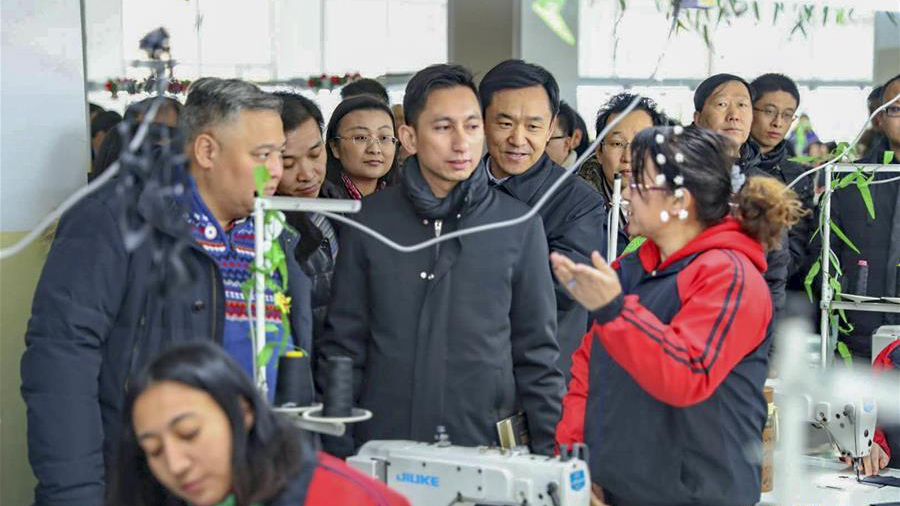

Editor's Note: Liu Lulu is an opinion editor with CGTN Digital. The article reflects the author's opinions, and not necessarily the views of CGTN.
China's State Council Information Office published a white paper on Xinjiang Uygur Autonomous Region on Sunday. Titled as "Historical Matters Concerning Xinjiang," the paper emphasized that "Xinjiang has long been an inseparable part of Chinese territory" where ethnic cultures are well preserved.
It is not the first time that the Chinese government has released a white paper on the issue of Xinjiang this year. In March, Beijing elaborated its efforts in anti-terrorism and human rights protection in the region.
But still, Western forces with ulterior motives are obstinate in their Xinjiang hype, using religious freedom as a pretext to vilify Beijing. On Thursday, U.S. Secretary of State Mike Pompeo even branded Beijing's treatment of the Uygur minority as the "stain of the century," which is totally groundless.
Facts speak louder than words. Among 25,000 venues for religious activities in Xinjiang, there are 24,400 mosques. On average, 530 Muslims in Xinjiang share one mosque, according to China's foreign ministry. The figure is more explanatory when compared with the United States'. The number of mosques across the U.S. is less than one-tenth of that in Xinjiang. Pompeo may need to acquaint himself with this fact before lashing out at China's religious freedom.
Just as the white paper said, "the ethnic cultures in Xinjiang always have their roots in the fertile soil of Chinese civilization and make up an inseparable part of Chinese culture." Beijing's efforts in preserving ethnic cultures can never be underestimated.
It is worth noting that five languages are available in Xinjiang's college entrance examination. Ethnic minorities' spoken and written languages have been extensively used in local media outlets. More than 100 religious sites in Xinjiang are listed as Major Historical and Cultural Sites Protected at the National Level. These is strong evidence of Xinjiang's inclusiveness and tolerance where people of all ethnic groups enjoy full freedom and respect.

Diplomats from 12 countries visited a vocational center in Xinjiang from December 28-30, 2018. /Xinhua Photo
Moreover, Xinjiang has established vocational education and training centers to better protect human rights in recent years, a prerequisite to religious freedom. Nearly 13,000 terrorists have been arrested and more than 1,500 terrorist gangs destroyed since 2014, according to the white paper released in March. While the region was haunted by separatism, terrorism and extremism in the past, it has seen no terror attacks in three years thanks to the vocational education and training centers.
However, Western forces are deliberately turning a blind eye on these endeavors. In disregard of the facts, they tainted the vocational education and training centers as "concentration camps." This is nonsense. Their ultimate purpose is not to protect human rights, but to find trouble with China.
Branding itself as a bastion of freedom, the U.S. has ironically introduced the Muslim ban, blocking immigrants from traveling to the U.S. from five Muslim countries. This is blatant discrimination. According to a survey by Pew Research Center, 75 percent of respondents believed "there is a lot of discrimination against Muslims in the United States." If the Donald Trump administration really cares about human rights conditions, it should at least address its domestic religious discrimination first.
China has reiterated that it firmly safeguards religious freedom, but never tolerates any separatist, extreme or terror activities under the cloak of religion. The punishment on illegal religious activities is nothing to be hyped about, and should never be equated with "prosecution" on Uygur minorities.
The West is shooting itself in the foot if it insists on interfering in China's domestic affairs. As major powers in the world, the United States and other Western countries should abandon double standards and make an unbiased judgment on China's Xinjiang policy – a prerequisite for them to be trustworthy players on the global arena.
(If you want to contribute and have specific expertise, please contact us at opinions@cgtn.com)

Copyright © 2018 CGTN. Beijing ICP prepared NO.16065310-3
Copyright © 2018 CGTN. Beijing ICP prepared NO.16065310-3